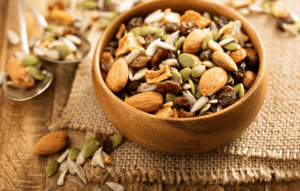When you think of stress, you might picture sleepless nights, a pounding migraine, or maybe a short temper. What you might not realize is that stress could also be padding your waistline. Yes, it may seem counterintuitive, but chronic stress can make you fat. How? Cortisol. Cortisol has many regulatory functions in the body and brain, but it is also known as “the stress hormone” that can wreak serious havoc on your body, particularly when combined with poor eating habits. Let’s unpack how this happens and, more importantly, what you can do about it.
eating habits. Let’s unpack how this happens and, more importantly, what you can do about it.
The Science Behind Stress and Fat Gain
Stress is a natural response designed to help you survive immediate threats. When your body perceives danger, it activates the hypothalamic-pituitary-adrenal (HPA) axis, flooding your system with cortisol. This hormone helps your body release energy, sharpens focus, and temporarily dampens non-essential functions like digestion.
While this response is helpful in short bursts, modern life keeps so many of us in a perpetual state of stress. Deadlines, financial pressures, massive amounts of media, and family responsibilities are all constant triggers. Elevated cortisol levels over time don’t just disrupt your sleep or mood – they actually encourage fat storage. Specifically, cortisol drives fat accumulation around the abdomen, a type of fat linked to increased risk for type 2 diabetes, heart disease, and even reduced testosterone levels.
How Stress Makes You Crave Comfort Foods
Ever notice how stress often has you reaching for a slice (or box) of pizza or a bag of chips? That’s no accident. Stress and cortisol change the way your brain processes hunger. Cortisol directly influences serotonin levels – the brain chemical responsible for feelings of happiness and relaxation. Sugary and fatty comfort foods trigger serotonin release, temporarily counteracting the stress response and making you feel better – at least for a little while.
This leads to a vicious cycle. Stress makes you crave comfort foods. Eating those foods provides a short-term sense of relief but leads to fat storage and guilt, which then creates even more stress. Over time, this pattern can derail your fitness goals and leave you trapped in a cycle of stress eating.
The Hidden Risks of Stress-Induced Weight Gain
Stress-induced weight gain isn’t just about aesthetics or squeezing into your favorite pair of jeans. It comes with serious health risks. Elevated cortisol levels contribute to:
- Central Obesity: Fat storage around the abdomen increases your risk for metabolic syndrome and cardiovascular disease.

- Insulin Resistance: Stress eating high-carb, sugary foods can lead to insulin spikes, which over time reduce your body’s sensitivity to insulin.
- Testosterone Reduction: Chronic stress lowers testosterone levels, impacting muscle mass, energy, and libido.
- Mental Health Decline: The guilt and frustration associated with stress eating can create a negative feedback loop, increasing feelings of depression and anxiety.
Breaking the Cycle
The good news is that you can stop this cycle before it gets out of hand. While you can’t eliminate stress completely, you can manage it more effectively and reduce its impact on your waistline.
Manage Stress Proactively
- Mindfulness Practices: Techniques like meditation, deep breathing, or yoga can lower cortisol levels. These practices help you respond to stress instead of reacting to it.
- Physical Activity: Exercise is a powerful stress reliever. Resistance training and cardio both reduce cortisol while boosting endorphins, your body’s natural feel-good chemicals.
Make Smarter Dietary Choices
- Healthy Comfort Foods: Swap out processed snacks for healthier options. Think dark chocolate (70% cocoa or higher), roasted nuts, or sweet potatoes.
- Don’t Fear Carbs: While low-carb diets have their place, avoiding carbs entirely can backfire by increasing cortisol and making cravings worse. Opt for nutrient-dense carbs like fruits, vegetables, and whole grains.
- Protein Power: High-protein meals help stabilize blood sugar and keep you fuller for longer, reducing the urge to snack under stress.

Building a Stress-Resilient Lifestyle
To keep stress from sabotaging your health, you’ll need to develop habits that support long-term resilience. Here’s how to get started:
- Prioritize Sleep: Poor sleep amplifies cortisol and hunger hormones like ghrelin. Aim for 7-9 hours of quality sleep each night. Establish a calming bedtime routine, reduce screen time before bed, and ensure your bedroom is dark and cool.

- Make Small, Sustainable Changes: Crash diets and extreme restrictions often fail because they add stress to your already taxed system. Gradually transition to healthier eating habits, focusing on consistency over perfection.
- Allow for Balance: Completely cutting out your favorite indulgences can lead to feelings of deprivation and eventual relapse. Enjoy treats occasionally but in moderation. The goal is to build a diet you can stick to for the long haul.
Practical Action Plan to Address Stress Eating
One thing you can’t do is ignore your stress or compartmentalize it endlessly; you need to be tactical and intentional with this stuff if you don’t want it to dominate your life.
- Identify Triggers: Keep a journal to track when and why you reach for comfort foods. Are you stressed at work? Arguing with your partner? Awareness is the first step.
- Stock Your Kitchen Wisely: Keep healthy snacks on hand to replace processed junk food. If chips aren’t in the house, you can’t eat them.
- Plan Stress-Reducing Activities: Build daily habits like exercise, journaling, or spending time in nature to reduce your overall stress load.
- Focus on Progress: Don’t beat yourself up for small slip-ups. Celebrate small wins, like choosing an apple over a candy bar or walking instead of driving.

Final Thoughts
The idea that stress can make you fat might sound strange, but the science is clear. Chronic stress and elevated cortisol levels not only increase cravings for comfort foods but also encourage fat storage, particularly around the abdomen. The good news? By managing stress effectively and making smarter dietary choices, you can break the cycle and take control of your health.
Start small. Replace one unhealthy habit with a healthier one today, and you’ll be on your way to a stress-resilient lifestyle. So yeah, it is strange but it’s also true – stress can make you fat, but it certainly doesn’t have to. With the right approach, you can use it as a catalyst for better health and well-being.










